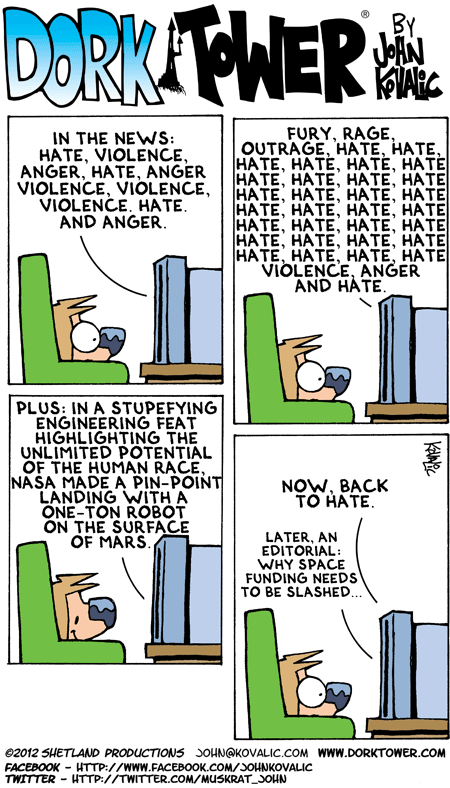LongTomH
LongTomH's JournalShades of the 'National Aerospace Plane'
Older DUers who were following aerospace news back in the 1980s may remember all the hype about the National Aerospace Plane, (NASP).
This project came out of the ultra-top-secret DARPA 'Copper Canyon' study. President Ronald Reagan announced the NASP program in his 1986 State of the Union Address; it was sold to the American public as the prototype for an "Orient Express" that could reach Tokyo in two hours and, as a single-stage-to-orbit replacement for the Space Shuttle.
A lot of people in the pro-space movement, including the National Space Society (of which I was a member) bought into the hype. Others were not so easily convinced: An aerospace craft that could reach near-orbital speeds (Mach 20-25) in the atmosphere would undergo incredible heating (1800-3000 deg F). Insulating tile like those on the shuttle only work when the heat load is relatively brief; insulation only slows the progress of heat to the aerospace craft's skin. In prolonged hypersonic flight, the problem would be heat soak; heat would have time to reach the skin of the craft. So, an active cooling system would be needed, along with a new generation of refractory (heat-heat) resistant materials. An active cooling system would probably be one that passed fuel (liquid hydrogen in most designs) under the skin to carry away heat.
An active cooling system would add weight to the vehicle. There was also the issue that scramjet engines, ramjets that can operate at hypersonic speeds, don't even begin to work until they're moving at about Mach 6 or greater. That meant the NASP would have to have two or three propulsion systems: One for takeoff to about Mach 3, another to work in the realm from Mach 3 to Mach 6, and the scramjet from Mach 6 upward. I might add that air-breathing engines are heavier than rockets.
The weight of the active cooling systems and the multiple propulsion systems would largely negate the advantage that airbreather systems seemed to promise.
The National Aerospace Plane project was finally terminated in 1993. A few years later, in 1996, aerospace writer G. Harry Stine announced that the National Aerospace Plane project had been a cover for a military project to develop hypersonic flight! Nothing ever flew except unmanned test vehicles, like the Waverider.
So we lost a number of years when we could have been working on a practical successor to the Space Shuttle, probably a two-stage, completely reusable vehicle.
As for hypersonic flight becoming commercially feasible in any foreseeable future, I would point to the Anglo-French Concorde. Between its first flight in 1976 and its retirement in 2003, the Concorde was a consistent money loser; it was only flown by airlines like British Airways and Air France that were subsidized by their respective governments. Even the British and France haven't been tempted to invest in a Concorde II (The US supersonic transport program was wisely terminated early in the 1970s).
The reasons for the Concorde's lack of commercial success and the reason hypersonic flight isn't likely to be commercially viable, are two fold: 1) Cost of fuel, or the laws of economics meet the laws of aerodynamics. Somewhere around Mach 1.8, the energy needed to overcome drag starts increasing rapidly. 2) Cost of maintenance: Airlines prefer a robust vehicle that doesn't break the bank in terms of maintenance labor or material cost. Supersonic and hypersonic aircraft would require exotic, expensive materials and many more man-hours of maintenance by highly skilled workers.
The reasons given above are largely the reason modern aircraft don't fly appreciably faster than the original Boeing 707 in the late 50s. Most of the design studies conducted by NASA and big aerospace are aimed at reducing fuel consumption, not achieving supersonic or hypersonic speeds.
Dork Tower comic comments on Curiosity and media coverage

Insightful? I'd say so!
Edited to add: I got the link to this toon from Phil Plait's Bad Astronomy blog. Dork Tower is a British web comic for geeks. Yes, they do have geeks in the UK, just like us Yanks!
The speech from the right has become 'ELIMINATIONIST'
Wikipedia's definition of eliminationism:
Goldhagen maintains that eliminationism has been the cause of every mass killing in the 20th and 21st centuries.
AlterNet contributor David Sirota commented on the eliminationism inherent in Glenn Beck's vile rhetoric: Glenn Beck Finally Admitted His Great Desire: To 'Eradicate' Progressives:
The lesson was eminently clear, coming in no less than the keynote address to one of America's most important political conventions. Beck taught us that a once-principled conservative movement of reasoned activists has turned into a mob -- one that does not engage in civilized battles of ideas. Instead, these torch-carriers, gun-brandishers and tea partiers follow an anti-government terrorist attack by cheering a demagogue's demand for the physical annihilation of those with whom he disagrees -- namely anyone, but particularly progressives, who value "community."
Author David Niewert has blogged on the subject at Crooks and Liars, among other places. He's also the author of: Eliminationism: How Hate Talk Radicalized the American Right.
From a review:
Is OWS making billionaires paranoid?
Are they making them paranoid enough? There's an interesting posting in NYmag: The Other Barbarians at the Gate with an interview with real-estate mogul Jeff Greene. Greene seems to think his billionaire neighbors should be paranoid:
I love that line about "socioeconomic snuff porn!"
This reminds me of an excerpt from an old history text on the young nation of America's response to the French Revolution: The author spoke of aristocrats in the US "fingering their white throats" while reading news from France. Yeah, I went to college a long time ago, and they were allowed to print things like this.
Read the rest of the article at: http://nymag.com/news/business/themoney/jeff-greene-2012-8/
Profile Information
Member since: Wed Oct 13, 2004, 05:42 PMNumber of posts: 8,636